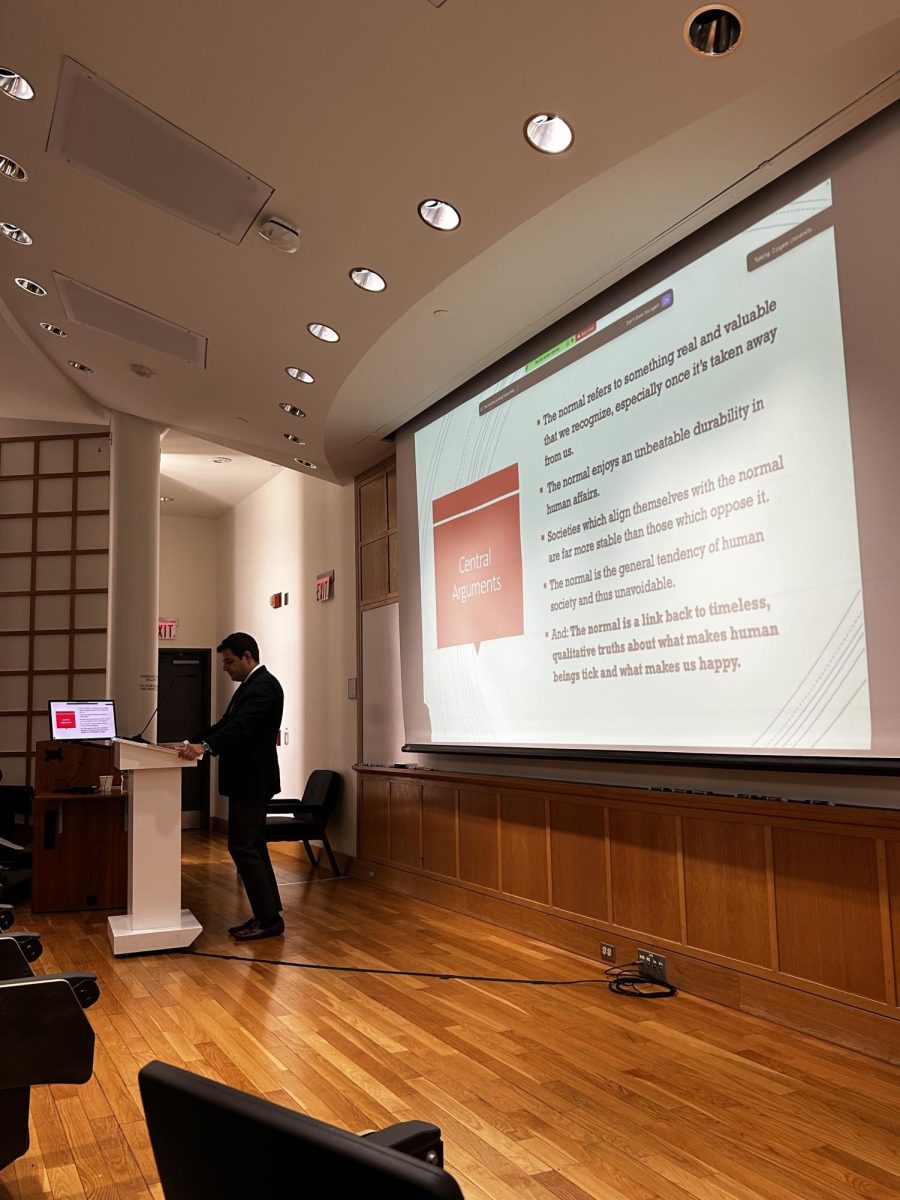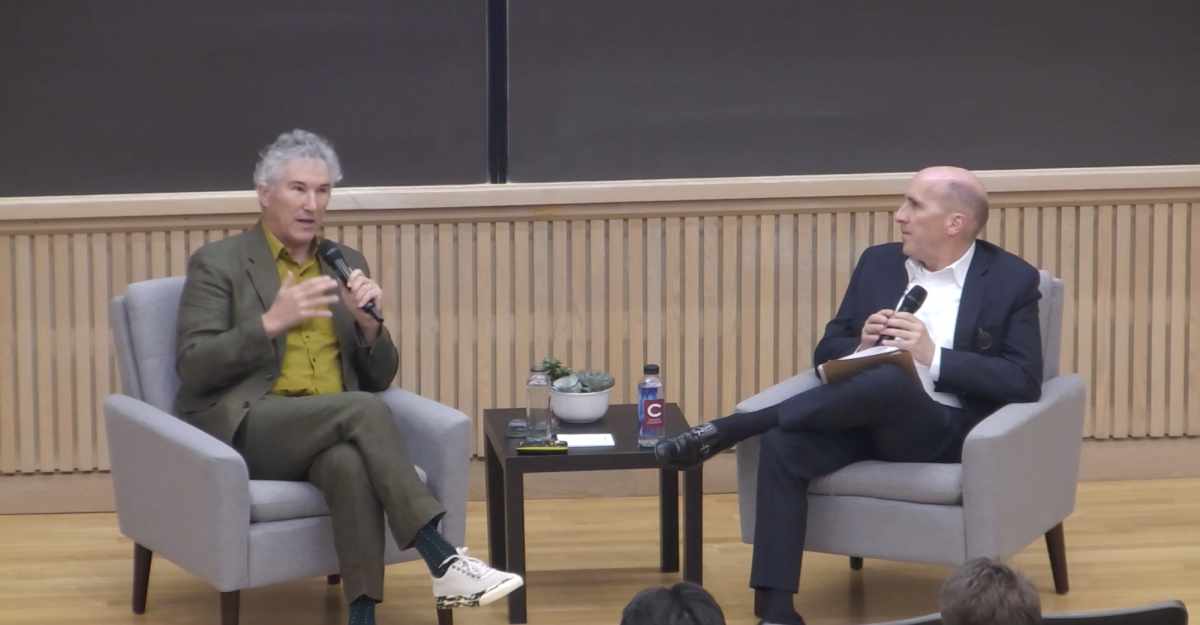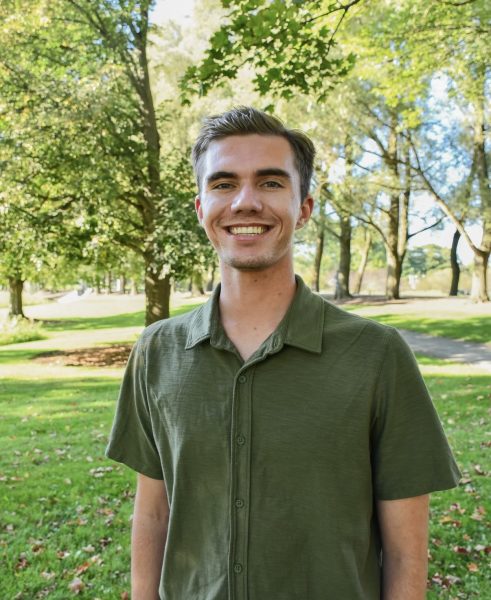Marc Randolph, co-founder and former CEO of Netflix, spoke at the annual Arts, Creativity and Innovation Weekend on Friday, April 4 with a keynote address at the Colgate Memorial Chapel. Randolph has spent 40 years starting and building multiple businesses. Currently, he serves as a mentor to young entrepreneurs, guiding them in building their own start-ups.
Sponsored by the Kerschner Family Series Global Leaders, Randolph answered questions from Colgate University President Brian W. Casey — as well as students and visiting alumni in the audience — about entrepreneurship, innovation and the benefits of a liberal arts education.
Randolph described his college experience as “a safe space to start things.” He described wanting to be involved in an outdoor organization, and when he realized there was no longer an active club, he restarted it. After graduating from Hamilton College with a degree in geology, Randolph listed a number of jobs in which he was unsuccessful. His success, he said, came in the form of “bad ideas.”
“There is no such thing as a good idea. Every idea is bad, and your job as an entrepreneur is to figure out why it’s bad,” Randolph said. “When you have a good idea, it’s always in your head where it’s safe and warm.”
He explained that a good entrepreneur is not obsessed with their theoretical good idea, but fixated on solving the problems that come with executing that idea.
Randolph and Casey also discussed the importance of liberal arts education.
“You’re advising a young person who just got accepted to college at Caltech and Colgate who wants to be an entrepreneur,” Casey asked. “Shouldn’t they go to Caltech?”
“I am so convinced that the skills that you need for the world are what you learn from a liberal arts school,” said Randolph, citing his writing and public speaking courses as the most valuable curriculum from his education.
Randolph went on to describe how the skills gained in a liberal arts school, such as being able to defend an argument, communicate clearly and make an opinion will allow students to adapt to a changing world. To Randolph, the students with these skills will be able to “disrupt” the business world in the same ways that he disrupted Blockbuster with Netflix’s film-by-mail model.
Casey compared colleges today to the VHS tapes that Blockbuster sold, wondering whether American higher education was becoming similarly obsolete.
“Your business model is dependent on finding people who, at some point in the next 20 years, are going to have to pay $400,000 […]. It’s a business model which is increasingly unsustainable,” Randolph said. “Without disrupting yourself, you are leaving yourself open for someone else to disrupt you.”
Sophomore Amy Glasman attended Randolph’s talk because of her own love of entrepreneurship.
“It was amazing to hear about the process of building Netflix and getting to see someone who is such an expert in the field and see their thought process,” Glasman said. “I think it’s inspirational to see how they get there and how nonlinear it can be.”
Sophomore Jodie Harvey similarly expressed appreciative sentiments.
“I found it really inspiring,” Harvey said. “I think his passion for entrepreneurship was really interesting to see. You could tell how much he loves doing what he does. It’s kind of contagious. It has made me think, ‘What could I do?’ It would be so exciting.”













Sean Hallahan • Apr 11, 2025 at 9:46 am
I listened to the entire interview, the best I’ve seen recently. The central topic was Disruption. “Are we, are colleges ripe for Disruption” Brian asked. “Absolutely!” was Randolph’s immediate reply. The business model is just one aspect that exposes colleges to disruption. ACI is an innovation changed designed to mitigate Colgate’s susceptibility to Disruption. Disruption is a daily occurrence splashed across the headlines on a daily basis. I think much a deeper examination of the Academy’s and Colgate’s disruption vulnerabilities should be part of Colgate’s leadership in Education. Thank you. Light ‘n Love best & cheers, Sean Hallahan ’73